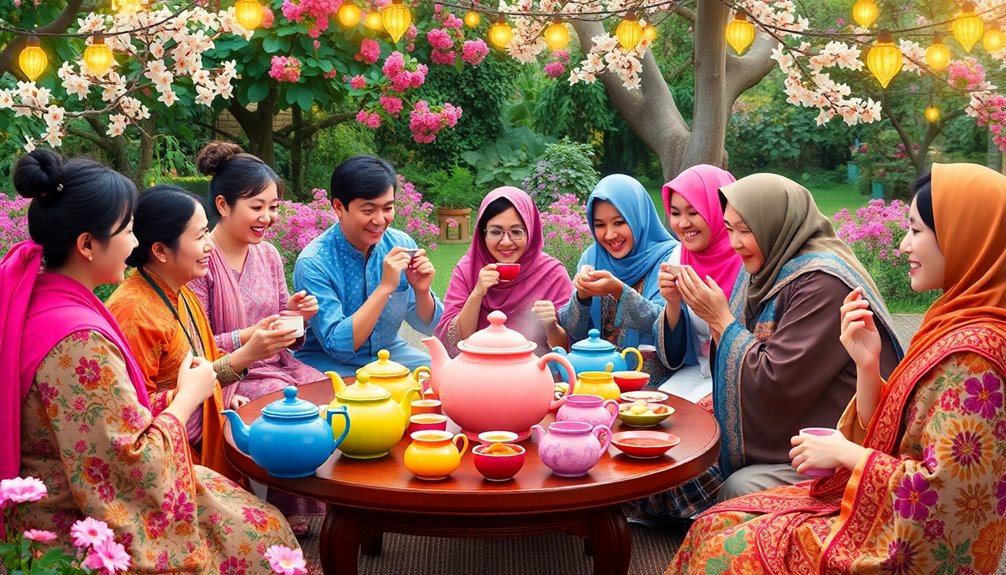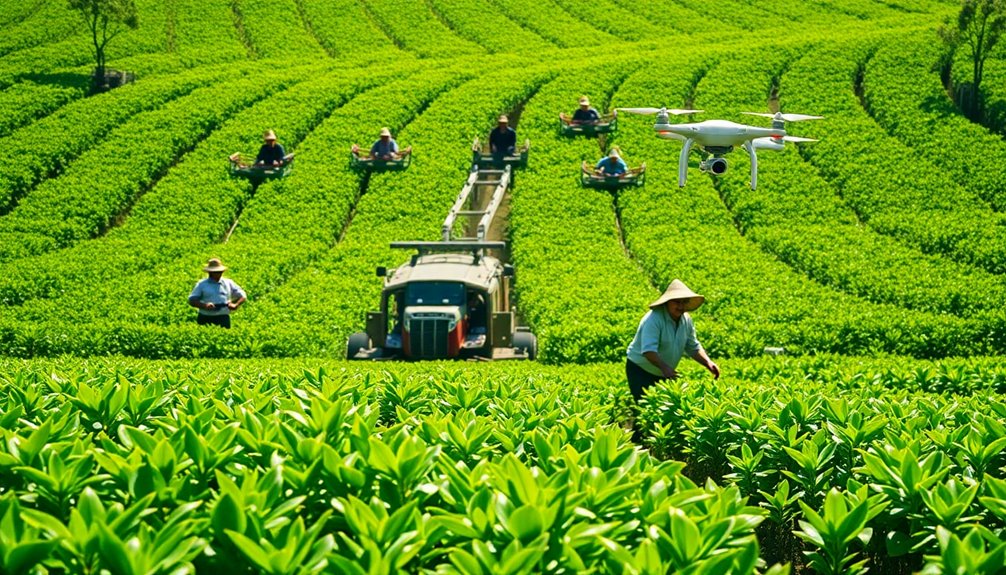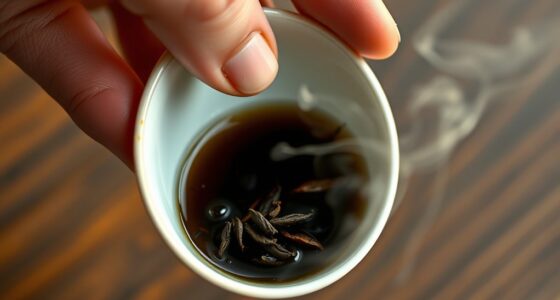Tea brings you and your community together in many wonderful ways. It symbolizes kindness and friendship across cultures. Every time you share a cup of tea, whether it's British afternoon tea or Indian chai, you deepen connections. Tea rituals foster inclusivity, bridging gaps between different backgrounds. In various traditions, like the Japanese tea ceremony, it promotes respect and unity. Hosting tea gatherings or joining online tea groups can strengthen bonds, especially when times are tough. So, next time you sip tea, remember it's more than a drink—it's a connection. Discover more about how tea builds community around the world!
Key Takeaways
- Tea serves as a universal symbol of hospitality, fostering connections and strengthening relationships among diverse cultures worldwide.
- Daily rituals around tea create opportunities for shared experiences, enhancing bonds among family and friends across generations.
- Cultural tea ceremonies promote mindfulness and respect, encouraging community engagement and reconciliation among different backgrounds.
- Sharing tea acts as a peace offering, promoting goodwill and understanding, which nurtures relationships and community cohesion.
- Online tea groups and virtual gatherings allow enthusiasts to connect globally, maintaining a sense of community even during challenging times.
Introduction
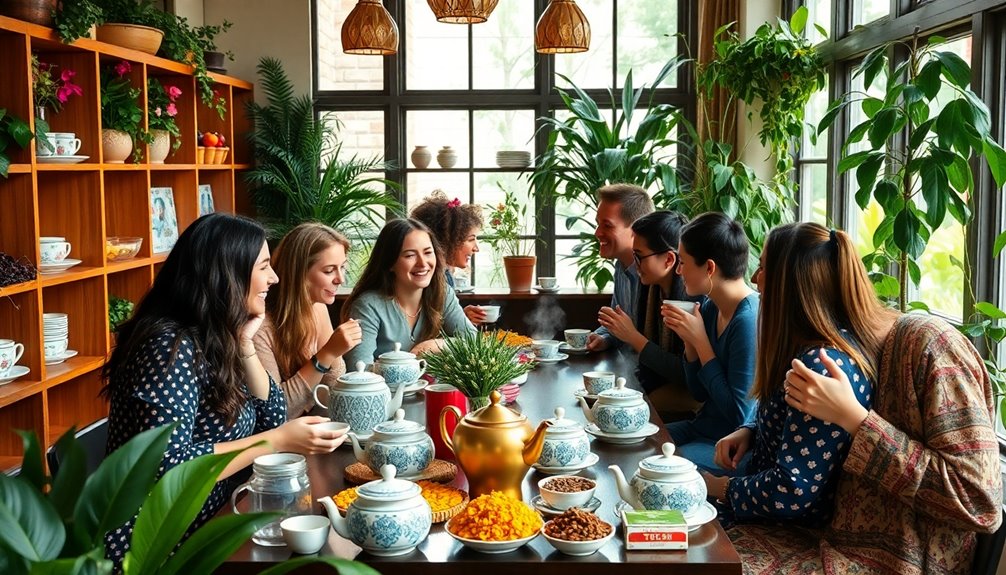
Global tea traditions, from the serene Japanese tea ceremony to the lively British afternoon tea, highlight how tea brings people together.
These social gatherings transcend language and geographical barriers, uniting people through shared experiences.
Cultural Significance of Tea
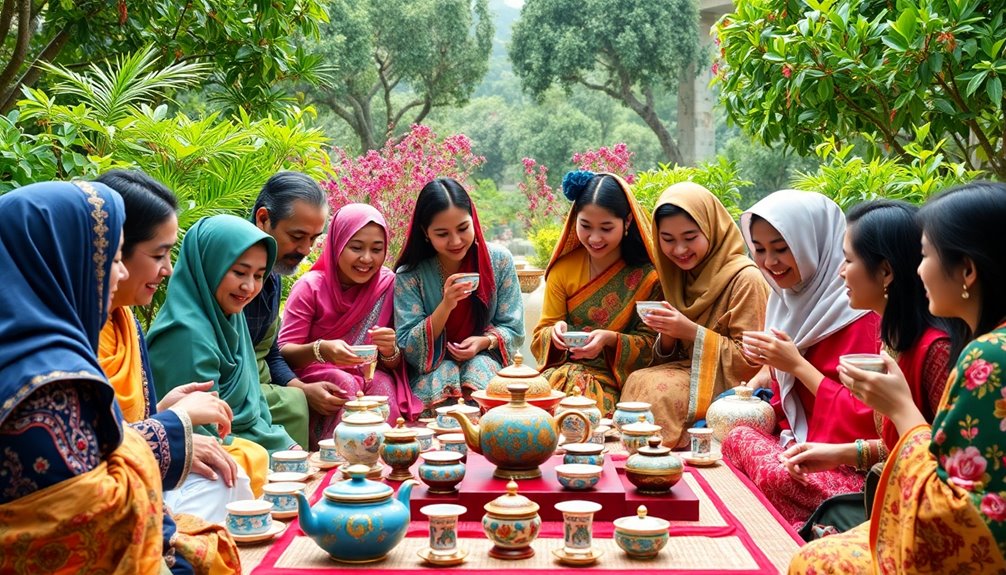
Tea holds deep cultural significance in communities around the world, often serving as a symbol of hospitality and connection. From a warm cup of chai in India to refreshing mint tea in Morocco, these tea traditions help strengthen bonds among family and friends. When you share a cup, you're not just enjoying a beverage; you're participating in a daily ritual that brings people together.
In many cultures, tea drinking acts as a bridge between generations. It's a family tradition that immigrants cherish, as they gather to celebrate their roots. These gatherings allow people to share stories, laughter, and love, reinforcing the importance of community. Since tea is widely consumed, it's a common ground for everyone, regardless of their background.
Tea culture is about more than just the drink itself. It embodies values of friendship, respect, and togetherness. Whether you're at a formal ceremony or a casual get-together, tea helps promote connections that go beyond words.
Tea Fosters Social Connections
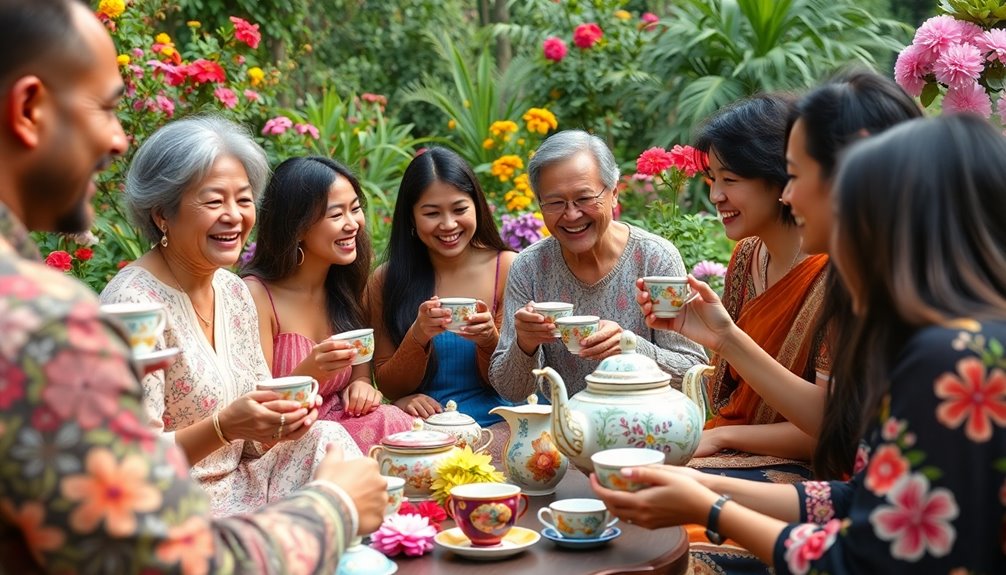
Across various cultures, the act of sharing tea creates powerful social connections that deepen relationships. Tea drinking is more than just a refreshment; it brings people together. In Britain, the tradition of afternoon tea fosters bonds among friends and family, while Moroccan mint tea serves as a warm symbol of hospitality. These rituals play a significant role in strengthening social ties.
Cultures around the world celebrate tea differently. In India, sharing a cup of chai is a heartfelt gesture of friendship. Online tea groups have also emerged, allowing enthusiasts to connect, share experiences, and learn, especially during challenging times like the pandemic. Though these online interactions may not always replace in-person connections, they still foster a sense of community.
In the U.S., tea expos and local events help tea bloggers, vendors, and enthusiasts meet and build lasting friendships. With over 60% of global tea production coming from smallholder farmers, tea serves as a bridge, linking diverse communities and cultures. Additionally, the act of sharing tea can promote relaxation and enhance overall well-being, similar to the benefits of certain essential oils.
Ultimately, tea isn't just a drink; it's a symbol of unity that celebrates togetherness and friendship across the globe. So, pour yourself a cup and connect with someone today!
Tea as a Peace Offering
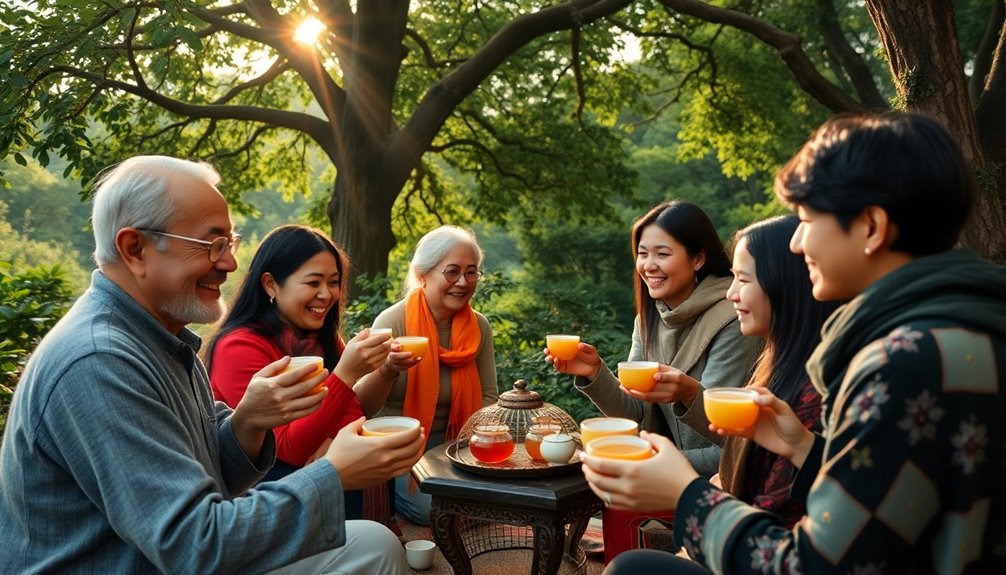
Sharing a cup of tea often serves as a bridge to peace, fostering goodwill and understanding between individuals. In many cultures, offering tea is a heartfelt gesture, symbolizing friendship and unity.
For instance, Moroccan mint tea is a staple, inviting guests to gather around and enjoy each other's company. The soothing aroma and flavor create a welcoming atmosphere.
In India, brewing tea, especially chai, plays a significant role in daily life. It brings people together over a cup, encouraging conversations that strengthen community bonds.
Similarly, the Japanese tea ceremony emphasizes respect and harmony, making it a perfect setting for reconciliation and understanding.
When conflicts arise, a simple cup of tea can act as a peace offering, inviting dialogue and nurturing relationships across cultural divides.
The medicinal properties of tea leaves can soothe not just the body but also the spirit, making it a powerful tool for healing.
Cultural Appropriation in Tea Practices
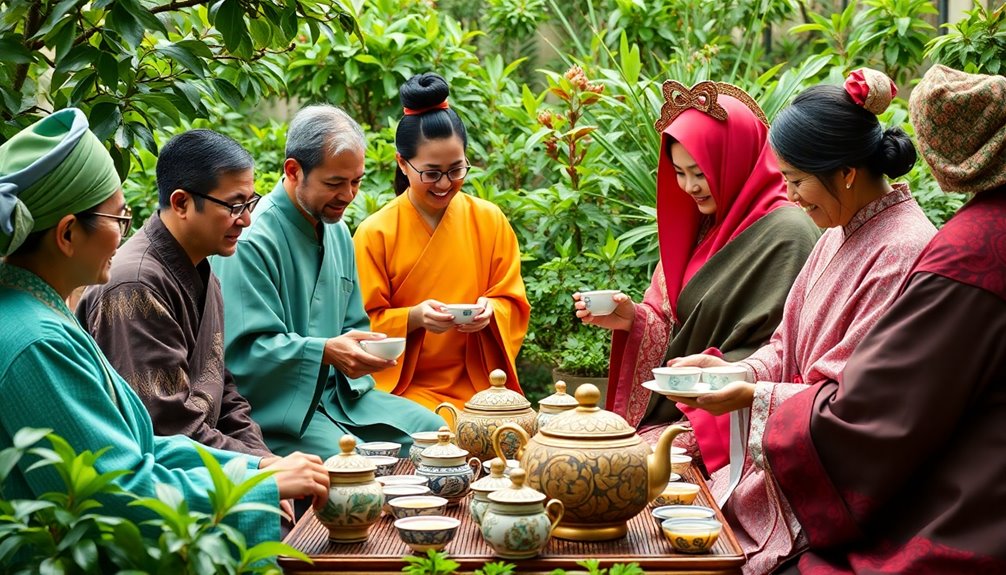
How can we appreciate the rich traditions surrounding tea without crossing into cultural appropriation?
It's important to understand that cultural appropriation happens when we take elements from another culture, like the Japanese tea ceremony or the Gongfu tea ceremony, without respecting their significance. This can lead to commercialization and misrepresentation of these beautiful traditions.
When you enjoy traditional tea, like green tea or fresh mint tea, take a moment to learn about its roots. Recognizing the historical context of these drinks shows cultural sensitivity.
If you're preparing and serving tea, consider how you can honor the practices that come from different cultures. For example, instead of blending styles randomly, think about what makes each tradition unique.
Embrace the flavors and rituals while promoting appreciation rather than appropriation. This means respecting the origins and significance behind each cup you share. Additionally, exploring different types of flower teas can deepen your understanding of the health benefits of flower teas, enriching your tea experience.
Practical Applications
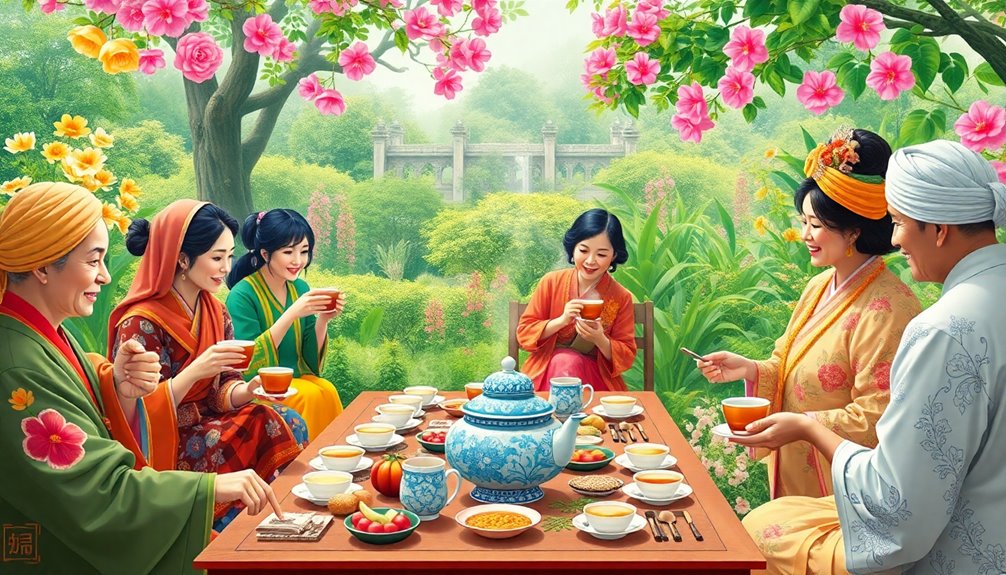
Embracing tea as a social ritual can significantly enhance community bonds and create meaningful connections. You'll find that drinking tea, often consumed in various cultures, brings people together in warm and welcoming ways.
For instance, enjoying mint tea in Morocco or participating in black tea traditions in India can foster community bonding.
Around the globe, cultural tea ceremonies like the Chinese Gongfu or the Korean Darye emphasize mindfulness, creating shared experiences that unite participants. These gatherings invite everyone to slow down, chat, and enjoy each other's company.
In today's digital age, the tea industry has adapted too. Online platforms and local tea events allow tea enthusiasts to connect, even from a distance.
You might join an international Facebook group or a Zoom tea circle, enhancing social interaction during times of isolation. These virtual gatherings help maintain the spirit of community bonding that tea represents. Additionally, the health benefits of tea, such as antioxidant-rich green tea, can serve as a topic of discussion and shared interest among friends and family.
Frequently Asked Questions
How Did Tea Influence the World?
Tea's historical journey shaped trade, culture, and social customs worldwide. You see its influence in rituals, economic support for farmers, and its role as a universal beverage that fosters connections across diverse communities.
How Does Tea Connect People?
Tea connects you by creating shared experiences and fostering conversations. Whether you're enjoying a cup with friends or participating in online communities, it cultivates bonds and enriches relationships, making each moment together meaningful and memorable.
What Is the Cultural Importance of Tea?
Tea's cultural importance lies in its role as a bridge between people. It fosters connection and hospitality, enriching traditions and rituals while creating shared moments that celebrate community, respect, and the joy of togetherness.
How Does Tea Connect Places?
Tea connects places by creating shared experiences. You gather with friends, savoring flavors and stories. From local cafes to online forums, tea bridges cultures, fostering friendships that transcend distances, uniting diverse communities over a simple cup.
Conclusion
In conclusion, tea isn't just a drink; it's a bridge that connects people worldwide. Whether you're sharing a cup with friends, using it to mend fences, or celebrating traditions, tea plays a special role in bringing us together. By understanding its cultural significance and respecting different practices, you can enjoy tea's warmth even more. So next time you brew a cup, think about the friendships and stories it can create! Cheers to tea and togetherness!

